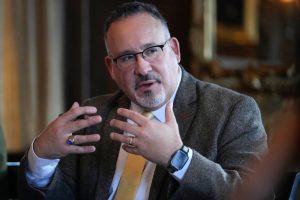
MN House has a billion-dollar infrastructure bill. But will it stay that way or even pass?
With just weeks left in the legislative session, a roughly $1 billion public infrastructure borrowing proposal is seeing discussion at the Minnesota Capitol. But whether the bill will cross the finish line in time is unclear.
A capital investment proposal from DFL House lawmakers calls for hundreds of millions for universities and colleges, prisons, transportation and improvements at the state Capitol.
In even-numbered years, borrowing for projects like those is typically one of the top orders of business at the Legislature. But with just weeks left of the session and limited Republican appetite for more borrowing, it’s unclear how many projects will get funding, or if the bill will pass.
Minority Republicans want a smaller bonding bill, and since borrowing needs a supermajority, the DFL will need their support. Republicans have not yet put forward a bonding proposal of their own.
What’s in the House DFL bonding bill?
As it stands, most of the $980 million bonding bill is for statewide infrastructure projects. Another $39 million or so in a separate but related bill is from the general fund. It’s near the size of the bonding proposal Gov. Tim Walz pitched in January.
A little more than $300 million is set aside for local projects in lawmakers’ districts, and would be split up as the bonding proposal moves forward.
House lawmakers have been holding hearings on the proposal this week and plan to hold a committee vote on Wednesday.
Top spending areas include:
• $114 million for improvements at state prisons.
• $64 million for asset preservation at both the University of Minnesota and Minnesota State Colleges and Universities.
• $48 million for public safety, with most going to a Bureau of Criminal Apprehension regional office and crime lab in Mankato.
• $45.7 million for transportation, $37.7 million of which will go to major local bridge replacement and rehabilitation.
• $31 million for improvements at the state Capitol, including an upgraded tunnel to the State Office Building currently under renovation for half a billion dollars.
• $28.9 million for the Department of Veterans Affairs, including $16 million for renovations of the Minneapolis Veterans Home.
Will it get through?
While DFLers control the Senate, House and the governor’s office, they need a three-fifths supermajority in both chambers to pass borrowing bills – meaning they’ll need GOP backing.
“House Republicans remain open to a bonding bill but the content matters,” Minority Leader Lisa Demuth, R-Cold Spring, said in a statement, adding that her caucus wants to be responsible with borrowing after significantly grew spending last year.
During last year’s session, Walz and the DFL majorities in control of state government passed significant legislation, including a new $72 billion two-year budget that grew spending by about 40%.
Bonding is one of the few bargaining tools minority Republicans have with the majority DFL. Last year, Republicans got the DFL to support $300 million in aid for struggling nursing homes in exchange for their support on a $2.6 billion infrastructure bill that included $1.5 billion in borrowing.
So with Republicans already signaling they’re not interested in significant new borrowing, the lead House DFL representative on bonding is acknowledging the bill might have to shrink to move forward.
“As we move forward with a smaller target to reach consensus, I think that there will be further disappointment with some of the items that are in here that may have to be cut,” said House Capital Investment Committee Chair Fue Lee, DFL-Minneapolis.
A tighter bill this year comes after lawmakers passed a $2.6 billion bonding package in the 2023 session. Then, the state had an $18 billion budget surplus, allowing bigger, bolder proposals to move forward.
Now, with the state facing a budget shortfall in the next four years if lawmakers don’t keep spending to a minimum, that’s not going to be the case.
“This is a very difficult process; it was a hard process last year when we were basically raining money,” said Rep. Dean Urdahl, R-Grove City, the lead Republican on the Capital Investment Committee.
Related Articles
Minnesota House takes up gun control bills; OKs mandatory reporting for stolen firearms
Walz names Tikki Brown head of new state agency focused on children, families
Sen. Mitchell returns to Minnesota Capitol with her arrest looming over final weeks of session
A Minnesota senator faces a felony burglary charge. Here’s what happened and what could happen next.
DFL Sen. Nicole Mitchell says she won’t resign as state senate begins probe into felony burglary charge


